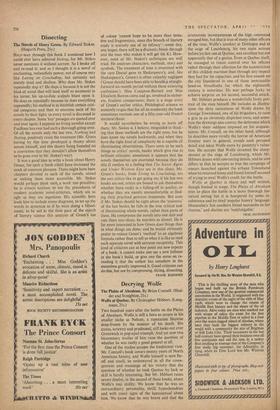Decrying Wolfe
Two hundred years after the battle on the Plains of Abraham, Wolfe is still a hero as secure in his smaller niche as Nelson; a reputation likewise deep-frozen by the manner of his death. His statue, scrawny and prodnosed, still looks out over Greenwich in pop-eyed triumph. And yet now two bicentenary studies of him raise the question of whether he was really a good general at all.
One of the studies' accepts the traditional view. Mr. Connell's book covers twenty years of North American history, and Wolfe himself is seen far- off and small, so embowered in all the conse- quences and meanings of his victory that the question of whether he took Quebec by luck or skill is hardly interesting. But Mr. Hibbert raises severe doubts, in the second of these books, about Wolfe's real ability. We know that he was an extraordinary personality, shrill, hypochondriac and with many signs of the homosexual about shim.' We 'know that he was brave and that the
aristocratic incompetences of the high command enraged him, but that is true of many other officers of the time. Wolfe's conduct at Dettingen and at the seige of Louisbourg, his two main actions before his last one at Quebec, was excellent but not apparently that of a genius. Even at Quebec itself, he managed to retain control over his officers rather through their affection for the eccentricities of this childish martinet than through any respect they had for his capacities, and his first assault on the city foundered in one . of those inexcusable head-on bloodbaths for which the eighteenth century is notorious. He was' perhaps lucky to achieve surprise on his second, successful attack.
Mr. Hibbert produces a wonderfully lively por- trait of the man himself. He includes as illustra- tions the dirty caricatures of. Wolfe drawn by George Townshend, one of his brigadiers, to raise a grin in an obviously. dispirited mess, and some- how the drawings also convey the deference which Wolfe's sheer oddness imposed on his acquain- tances. Mr. Connell, on the other hand, although he describes more vividly the horror of American frontier wars in .general, avoids such personal detail and takes Wolfe more by posterity's valua- tion. He accepts that Wolfe invented the sharp- shooter at the siege of Louisbourg, which Mr. Hibbert denies with convincing details, and he also differs in that he accepts as true the campaign of smears launched against the urbane Townshend when he returned home and found himself accused of trying to steal Wolfe's credit for the battle.
Wolfe at Quebec is sharp and well written, though limited in scope. The Plains of Abraham tries to place the battle in a more thorough his- torical setting but it is hampered by some in- coherence and by tired 'popular history' language. Montcalm's 'hot southern blood succumbs to her charms,' and diarists are 'indefatigable.'
NEAL ASCHERSON


































 Previous page
Previous page